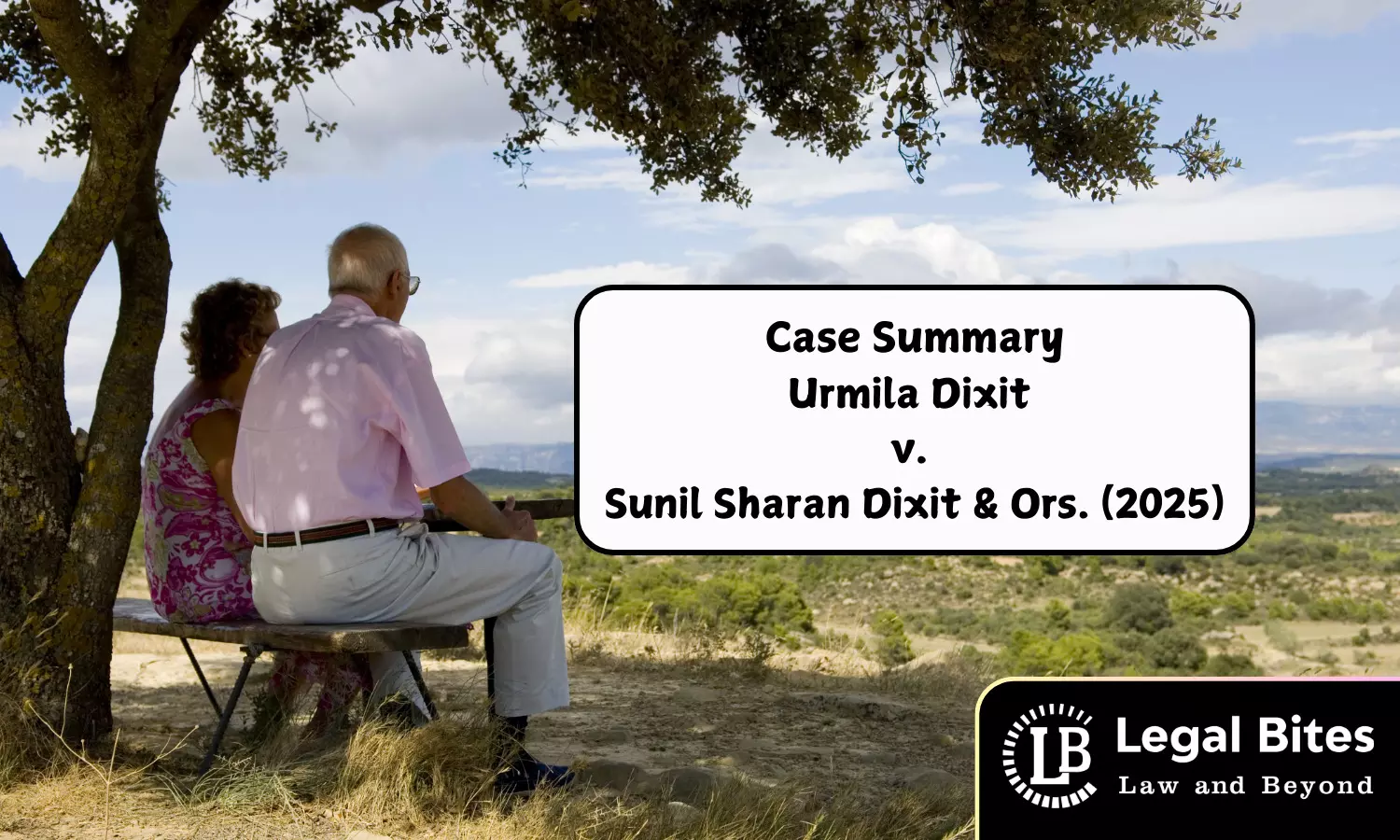Case Summary: Urmila Dixit v. Sunil Sharan Dixit & Ors. (2025) | Maintenance of Senior Citizens
The Supreme Court cancels a Gift Deed under the Maintenance and Welfare of Parents and Senior Citizens Act, 2007, due to a son's neglect of his parents.

This case highlights the broader societal issue of neglect and exploitation faced by senior citizens, emphasizing the importance of a purposive interpretation of welfare legislation. Case Summary: Urmila Dixit v. Sunil Sharan Dixit & Ors.Court: Supreme Court of IndiaCitation: Civil Appeal No. 10927 of 2024Bench: Sanjay Karol J. and C.T. Ravikumar J.Date of Judgment: January 2, 2025Background and Factual MatrixThis case revolves around the welfare and rights of senior citizens under...
This case highlights the broader societal issue of neglect and exploitation faced by senior citizens, emphasizing the importance of a purposive interpretation of welfare legislation.
Case Summary: Urmila Dixit v. Sunil Sharan Dixit & Ors.
Court: Supreme Court of India
Citation: Civil Appeal No. 10927 of 2024
Bench: Sanjay Karol J. and C.T. Ravikumar J.
Date of Judgment: January 2, 2025
Background and Factual Matrix
This case revolves around the welfare and rights of senior citizens under the Maintenance and Welfare of Parents and Senior Citizens Act, 2007 (hereinafter referred to as "the Act"). The appellant, Urmila Dixit, is a senior citizen and mother of the respondent, her son, Sunil Sharan Dixit.
The subject property was purchased by the appellant in 1968. On September 7, 2019, the appellant executed a Gift Deed transferring the property to the respondent. The deed included an implicit condition that the transferee (respondent) would maintain the appellant and make all necessary provisions for her welfare. Simultaneously, a promissory note (vachan patra) was executed, affirming the respondent’s obligation to care for his mother. However, the respondent allegedly failed to fulfill these obligations.
On December 24, 2020, the appellant filed an application under Sections 22 and 23 of the Act before the Sub-Divisional Magistrate (SDM), seeking to nullify the Gift Deed, alleging abuse and neglect by the respondent. The SDM declared the Gift Deed void, a decision upheld by the Collector and the Single Judge of the Madhya Pradesh High Court. However, the Division Bench of the High Court reversed these findings, prompting the appellant to approach the Supreme Court.
Key Issues for Consideration
- Interpretation of Section 23 of the Act: Whether the conditions for invoking Section 23 of the Act were fulfilled, justifying the cancellation of the Gift Deed.
- Jurisdiction of the Tribunal: Whether the Tribunal under the Act has the authority to cancel the Gift Deed and order possession of the property.
- Role of Beneficial Legislation: How the provisions of the Act, aimed at protecting senior citizens, should be interpreted to advance its objectives.
Contentions of the Parties
Appellant's Arguments:
- The Gift Deed was subject to the condition of care and maintenance, which the respondent failed to fulfill.
- The promissory note corroborated the conditional nature of the transfer.
- The Division Bench of the High Court erred in interpreting Section 23 of the Act narrowly, defeating its welfare-oriented purpose.
Respondent's Arguments:
- The Gift Deed did not explicitly contain any clause requiring maintenance.
- The promissory note was fabricated and could not be used to impose conditions not stated in the Gift Deed.
- The jurisdiction of the Tribunal was limited to determining whether explicit conditions in the transfer document were violated.
Supreme Court's Decision
Nature and Purpose of the Act:
- The Court emphasized that the Act is a welfare-oriented legislation aimed at protecting senior citizens from neglect and exploitation. It provides a speedy, inexpensive, and effective mechanism for redressal of grievances.
Interpretation of Beneficial Legislation:
- Beneficial statutes must be interpreted liberally to advance their objectives. The Court cited several precedents, including Brahmpal v. National Insurance Company and K.H. Nazar v. Mathew K. Jacob, to highlight that beneficial legislation should be given a purposive construction.
- Exemptions and conditions in such statutes must be construed narrowly to avoid defeating the legislative intent.
Application of Section 23 of the Act:
- Section 23(1) deems transfers of property by senior citizens void if they are made subject to the condition of maintenance and the transferee fails to fulfill the obligation.
- The Court noted that the Gift Deed and the promissory note, executed simultaneously, together demonstrated an implicit condition of maintenance.
Tribunal’s Jurisdiction:
- The Court clarified that Tribunals under the Act have the authority to cancel property transfers and order possession to be restored to senior citizens if necessary to ensure their welfare.
- This interpretation aligns with the intention to provide effective remedies to senior citizens.
Failure to Maintain:
- The respondent’s neglect and alleged abusive behaviour constituted a violation of the implicit conditions of the transfer.
- The Court underscored that strict interpretation of Section 23, as adopted by the Division Bench, undermines the Act’s purpose.
Restoration of Possession:
- The Court affirmed that restoring possession of the property to the senior citizen is essential to achieving the Act’s objectives. It directed the possession of the premises to be handed back to the appellant by February 28, 2025.
The Supreme Court directed the State of Madhya Pradesh to ensure compliance with its judgment. Pending applications, if any, were disposed of.
This landmark judgment upholds the dignity and rights of senior citizens, offering them protection under the law while emphasizing the broader societal responsibility toward their welfare.
Significance of the Judgment
Strengthening the Rights of Senior Citizens:
The judgment reinforces the rights of senior citizens under the Act and ensures that their welfare remains a priority.
Broad Interpretation of Beneficial Legislation:
By adopting a purposive approach to Section 23, the Court has set a precedent for interpreting welfare-oriented laws in a manner that advances its objectives.
Empowerment of Tribunals:
The judgment affirms the jurisdiction of Tribunals to cancel property transfers and order possession, ensuring senior citizens have effective remedies against neglect and abuse.
Social Justice and Constitutional Vision:
The decision aligns with the constitutional vision of social justice, as highlighted in Ashwani Kumar v. Union of India. It underscores the societal obligation to care for the elderly.
Click Here to Read the Official Judgment

Apurva Neel
I am a Research Associate and Editor at Legal Bites with an LL.M. specialization in Corporate and Commercial Laws from Amity University, Mumbai. I have put my best efforts into presenting socio-legal aspects of society through various seminars, conferences etc. I keep refining content as I am an ardent writer, and palpably law has got multi-dimensional aspect, so I passionately try to explore ahead.

